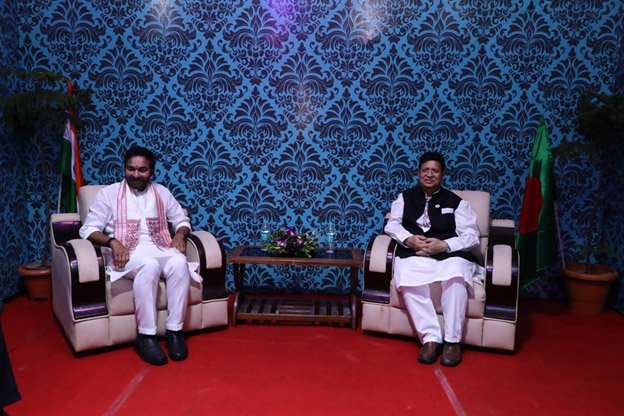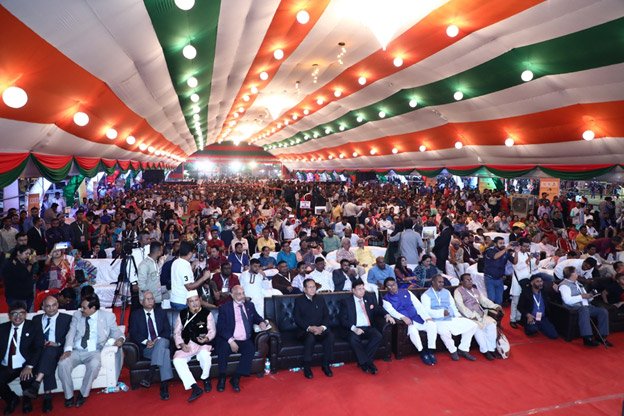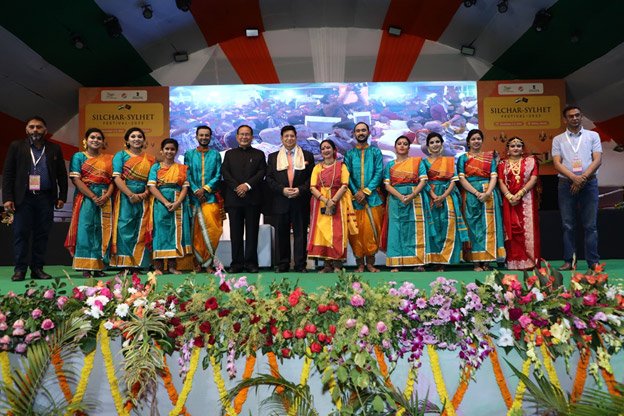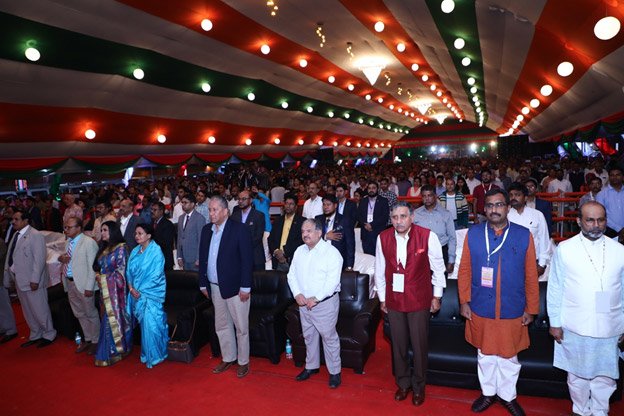The Silchar-Sylhet Festival 2022 was organised by India Foundation in association with the Ministry of Culture, Government of India & supported by Bangladesh- India Friendship Society, & India – Bangladesh Chambers of Commerce & Industry (IBCCI) on December 2-3, 2022 in the city of Silchar, Assam.
The cities of Silchar in Assam and Sylhet in Bangladesh share common bonds of history, language, culture, and a multitude of other commonalities, which is reflected in the excellent bilateral ties of an all-encompassing partnership based on sovereignty, equality, trust, and understanding that goes far beyond a strategic partnership. The popularity of the Festival and the sentiment shared on both sides of the border were reflected in the eminent speakers and audience in attendance. The Festival was addressed by 33 Speakers from both India & Bangladesh. This 2-day festival witnessed cultural, historical, literary, & business Interactions.
The Inaugural session was graced by Shri Kambhampati Hari Babu, Governor, Mizoram, India, Shri G Kishan Reddy, Union Minister for Culture, Tourism, & Development of North Eastern Region (DoNER), Government of India, H.E. Dr A K Abdul Momen, Minister for Foreign Affairs, Bangladesh, Shri Parimal Suklabaidya, Minister of Transport, Excise & Fisheries, Government of Assam, India, H.E. Mohmad Mustafizur Rahman, High Commissioner of Bangladesh to India, Iqbalur Rahim, Member of Parliament, Bangladesh, Gazi Mohammad Shahnawaz, Member of Parliament, Bangladesh, Mohibur Rahman Manik, Member of Parliament, Bangladesh, Mihir Kanti Shome, Member of the Assam Legislative Assembly, Dipayan Chakraborty, Member of the Assam Legislative Assembly, Kaushik Roy, Member of the Assam Legislative Assembly, Narayan Saha Moni, General Secretary, Bangladesh India Friendship Society, Bangladesh, Tahmin Ahemad, President, SCCI, Sylhet, Shekhar Sinha, Member, Board of Trustees, India Foundation, & Rajdeep Roy, Member of Parliament, India.

Dr Rajdeep Roy welcomed all the esteemed dignitaries to the festival. In his remarks, he stated that In 1947, the beautiful common land of Silchar and Sylhet was divided into two. As India celebrates 75 years of freedom and Bangladesh celebrates 50 years of existence, it is important to mention that following the war in 1971, India was the first country to recognise Bangladesh. And today after 50 years as we stand here, we see that the relationship between the two countries has gone far & wide.
H.E. Dr A K Abdul Momen said that engagements such as the Silchar-Sylhet Festival would further strengthen bilateral relations between both countries. Factors such as geographical proximity, cultural & historical ties especially linguistic, music, dance, literature and culinary traditions have contributed to our shared historical and cultural bonds. Bangladesh’s engagement with India’s North Eastern states is essential for the economic growth of both the countries. Bangladesh’s Zero tolerance policy against terrorism is effectively introduced and implemented by the government and has also contributed to maintaining stability in the North Eastern region which is acknowledged and appreciated by all. Regional peace and stability are essential for the economic prosperity & well-being of people and therefore Bangladesh takes a vow to have regional peace and stability with its neighbours. Bangladesh has opened sea ports by concluding bilateral instruments with India for facilitating access to North-East India to the sea ports of Bangladesh. Bangladesh is keen to increase riverine connectivity with Inland Waterways, India. Bangladesh is the largest trading partner of India in SouthEast Asia and on the other hand, India is the second largest global trading partner of Bangladesh. It is worth mentioning that the economic growth of Bangladesh is contributing to the economy of the neighbouring country.
Shri G Kishan Reddy, in his address, said that India & Bangladesh have strong civilisational, cultural, social and economic ties. India-Bangladesh relationship showcases the best cooperation, coordination & understanding as both countries share a common history, language, heritage, culture, arts & music. In 2021-2022, Bangladesh emerged as the largest trading partner of India in South Asia worth 16.15 billion U.S Dollars.
Shri Kambhampati Hari Babu said that the Sylhet region, in present Bangladesh and the Silchar area, has had a long connection throughout history. The twin cities of Sylhet & Silchar have strong historical & cultural connections. He felt overwhelmed by this initiative to revive age-old ties between the two countries. He further said that in today’s highly globalized world, it is imperative to maintain good diplomatic relations for mutual growth & development.
Shekhar Sinha, Member, Board of Trustees, India Foundation delivered the vote of thanks. The Inaugural Session was followed by cultural performances.
Day -2
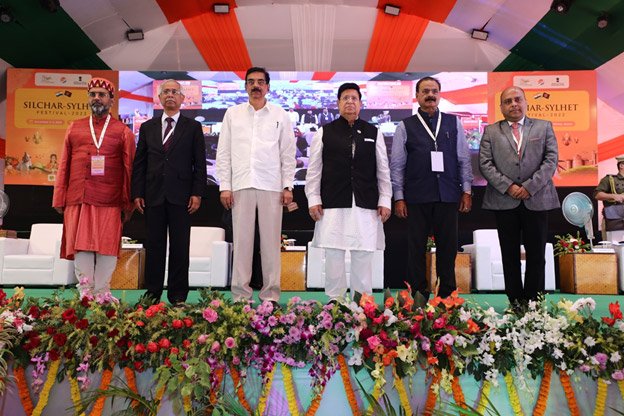
In the Trade & Commerce Inaugural session, Dr Rajdeep Roy initiated the session by highlighting the geographical proximity of the Bangladesh- India Border. Bangladesh is surrounded by India as it shares 4,096 km of land borders with India. Bangladesh with a population of 16. 94 crores is a huge potential market, there should be a symbiotic relationship with each other for mutual growth and prosperity.
H.E. Mohmad Mustafizur Rahman, High Commissioner of Bangladesh to India began his address by highlighting the reasons to invest in Bangladesh such as the steady macroeconomic environment, resilient domestic market & export-oriented industries which have positioned Bangladesh as one of the fastest growing economies in the world. The infrastructure & geographical location of Bangladesh is ideal for global Trade & Commerce. India has been time tested and is a trusted partner of Bangladesh in all possible areas of operation including trade & commerce. Today, Bangladesh is India’s largest trading partner in South Asia & India is the second largest trading partner of Bangladesh. Our two countries should stand with each other under any circumstances and encourage respective markets hoping to ensure a smooth, timely and predictable supply of essential commodities including agricultural products.
Shri Chandra Mohan Patowary, Minister for Environment & Forests, Act East Policy Affairs and Welfare of Minorities Department, Govt of Assam, began his address by highlighting the 5 ways given by Shri Narendra Modi that are essential for trade & commerce. Namely, Highways, Railways, Waterways, Airways & I-ways ( ‘I’ stands for Internet ). He discussed upcoming railways & airways connectivity projects in North-East India and Bangladesh.
In his remarks, H.E. Dr A K Abdul Momen stated that Bangladesh is one of the top 5 fastest growing economies in the world. India’s economy, which is the sixth largest now, is likely to become the world’s third-largest by 2050 following the United States and China. The IMF and World Bank predict India to remain the fastest-growing economy in the world during 2021-2024. Bangladesh too, since the devastating liberation war of 1971 as a sovereign and Independent country has come a long way from the days of famines and food aid dependency, Bangladesh is today self-sufficient. Geographical proximity makes the North Eastern region critical to Bangladesh to invest in sectors like food processing industries, IT etc. Bangladesh is India’s most important trading partner. India receives the highest number of tourists and medical patients from Bangladesh, thousands of Indian nationals are working in Bangladesh & they are contributing significantly to both countries. In concluding remarks, he said that “ I’m confident that the key bond of friendship existing between Bangladesh and India shall continue to grow and flourish. The business communities of both countries should grow close and play the role of imposter mutual prosperity and economic advancement for the benefit of our people”. He added that the Governments of both countries are sincerely working to further facilitate trade & commerce and have agreed to introduce negotiations on comprehensive economic partnership.
In his remarks, Shri Kambhampati Hari Babu stated that India is the fastest-growing economy in the world even compared to the most developed economy like the United States of America. The expansion of an economy provides lots of opportunities not only to the respective country but also to the neighbouring countries. He reiterated Prime Minister Shri Narendra Modi’s vision for the generation of solar power and reducing crude oil imports. Adding that Bangladesh & India share similarities as far as energy problems are concerned therefore the fuel can be taken by mixing ethanol with petrol and also by using electric vehicles by generating electricity through solar energy. India has free trade agreements with all its neighbours and Asian countries with lower tariff barriers. FTAs can encourage trade & investment between India and neighbouring countries. He gave a brief overview of Prime Minister Shri Narendra Modi’s ‘Local for Vocal’ campaign. “Products that are manufactured locally, people should think how to find their market globally” he added.
Panel Discussion- I on “Trade & Commerce” was chaired by Lt Gen Arun Sahni, Member, Governing Council, India Foundation. The panellists of this session were Mr Iqbalur Rahim, Member of Parliament, Bangladesh, Shri PVSLN Murty, Chairman & Managing Director, NEDFi, Mr Tahmin Ahemad, President, Sylhet Chambers of Commerce and Industries, Sylhet, Shri Ravi Patwa, Chairman, EIRC of ICAI, Ms Sharnalata Roy, President, Sylhet Women Chamber of Commerce & Industry, Mr Manoj Pant, Vice Chancellor, IIFT Delhi & Mr. Abu Tahir Md Shoeb, Ex-President, Sylhet Chamber of Commerce & Industry.

In his remarks, Mr Manoj Pant, Vice Chancellor, IIFT Delhi, stated that Bangladesh & the North-East region of India share enormous culture, connectivity, cultural links, & linguistic links. India exports yarn & cotton to Bangladesh, & Bangladesh exports garments to India & other countries. Without investments there can be no trade, there is no history of countries trading who don’t have foreign investments. Energy is crucial to India, especially gas, and Bangladesh is a major supplier of gas. There is a need to arrange agreements on how to bring in gas from Bangladesh.
Ms Sharnalata Roy, President, of Sylhet Women Chamber of Commerce & Industry, said, “We are one people, though the border has separated us”.
Shri PVSLN Murty, Chairman & Managing Director, NEDFi began his address by mentioning a few areas to work on to improve the trade & commerce between the two countries. First, the unavailability of
logistics is a major problem in the Northeast, improvement in manufacturing capacity & packaging capacity is needed. Land custom stations don’t have full facilities such as cold storage. There are export marketing barriers, logistics barriers & lack of knowledge in information. However, there is a huge scope for development in Barak Valley as investments & venture capital are coming on a large scale.
Mr Tahmin Ahemad, President, of Sylhet Chambers of Commerce and Industries premised his speech on increasing the trade of gold & stones between the two countries as Sylhet exports 75% of its gold & stones to other countries.
In his opening remark, Shri Ravi Patwa, Chairman, EIRC of ICAI said, “Comprehensive economic partnership agreements have a potential to make Bangladesh the 4th largest business partner for India & India the largest business partner for Bangladesh”. Indo-Bangladesh’s joint production of defence equipment, exploring potential areas for investments, and joint manufacturing for medicines & vaccines can boost the economy of the entire region. India has waterways potential and there is a need to develop waterways in India. He concluded his talk by stating that if Indo-Bangladesh trade has to develop, Inland waterways will have to be enhanced as presently India constitutes only 0.15% of goods movement.
Mr Iqbalur Rahim, Member of Parliament, Bangladesh expressed heartfelt gratitude to India for extending support to Bangladesh during the liberation war in 1971. He stated that Bangladesh considers India a great friend & gives utmost importance to the relationship of common history, shared culture, & economic affairs.
Lt Gen Arun Sahni, Member, Governing Council, India Foundation summed up the session by highlighting the important points & issues that came out of the talk. He gave precedence to the investment & development opportunities, trade & commerce, and connectivity issues related to the Barak River. Adding that to increase trade between both countries, capacity building on both sides is very important. Tourism, Trade deficit, technology exchange, and textile & gas requirement were important points reiterated by most of the speakers. The panellists acknowledged that the knowledge & awareness of opportunities of Government schemes and problems of exporters & importers should be addressed. Policymakers & regulators should give great impetus to waterways initiatives. With the collaborative efforts of both countries, issues of climate & sustainable development linkages both in supply chain & developmental activities, can be defeated.
Panel Discussion- II on “Our Rivers, Our Water, Our Climate” was chaired by Shri Ranjit Barthakur, chairperson, FICCI North-East; Founder, Balipara Foundation, & co-chaired by Dr Guru Prakash, National Spokesperson, Bharatiya Janta Party. The panellists of this session were Shri A. Selvakumar, Director, Inland Waterways Authority of India, Mr Gazi Mohammad Shahnawaz, Member of Parliament, Bangladesh, Mr Niranjan Roy, Professor, Assam University, India, Mr Abdul Hoque, Presidium Member, Bangladesh-India Friendship Society; Former Freedom Fighter & Shri Sabyasachi Dutta, Executive Director, Asian Confluence, India.
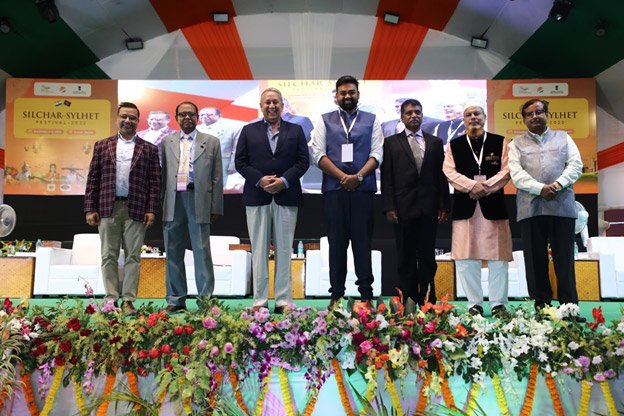
Mr Abdul Hoque pointed out that there were more than 400 rivers in Bangladesh out of which Bangladesh shared 57 rivers with India. He appreciated the Prime Ministers of both the countries for working together and promoting the green economy.
Selvakumar, Director, of the Inland Waterways Authority of India, began by explaining the developmental activities done by National Inland Waterways. Referring to the PM’s speech at the inauguration of the Dhola-Sadiya Bridge (River Brahmaputra), A. Selvakumar mentioned the importance of developing the North East region through the Act East Policy to reducing the isolation of the region by improving all round connectivity through road, rail, telecom, power and the waterways sector. In the Budget Announcement 2020-21, PM Shri Narendra Modi announced that the 890 Km Dhubri-Sadiva connectivity will be done in the North-East region. In the PM’s Independence Day Address-2021, he importantly mentioned the connectivity of the North-East with Bangladesh, Myanmar and South-East Asia under the Act-East policy.
Mr Niranjan Roy, Professor, Assam University, India, in his address, said that India & Bangladesh should look forward to the coming 50 years & strengthen the existing friendship with each other as India is practising a people-centric development plan guided by the philosophy of “Sabka Sath, Sabka Vikas, Sabka Vishwas, Sabka Prayas”. He added that the Look East Policy transforming to the Act East Policy is an example of our present Government’s commitment towards strengthening regional cooperation. Bangladesh is not just a friend of India but a close & good neighbour.
Shri Sabyasachi Dutta, Executive Director, Asian Confluence, India in his opening remarks, said that the Government, civil society & businesses need to come together to protect the environment. We need to look at the health of the river, from upstream-downstream & from the source to the destination. He proposed to have a museum of rivers be established in Silchar or Sylhet to strengthen the knowledge base of the river ecosystem of Bangladesh & India.
Dr Guru Prakash, National Spokesperson, of Bharatiya Janta Party said that “Better nation-to-nation relationship is based on better people-to-people relationship, and mechanisms like this are for a better interface between people to people. State actors, non-state actors, and political activists across the spectrum had engagements in the past & we look forward to having more meaningful engagements in the future”.
Shri Ranjit Barthakur, chairperson, of FICCI North-East; Founder, of Balipara Foundation summed up the session by highlighting a few important themes that emerged. India & Bangladesh are very close nations, both countries ran a people-to-people movement that gave people freedom, liberty and fraternity. He further said that water management is another important area to look at in the barak valley and that this foreign affairs dialogue is to work towards ecological diplomacy & riverine civilisation. He concluded by stating that India and Bangladesh should work in collaboration & interdependence as this is the theme of the world going forward.
Panel Discussion- III on “Language & Literature” was chaired by Mr Mohibur Rahman ManikMember of Parliament, Bangladesh and moderated by Rami N Desai. The panellists of this session were Shri Amitrasudan Bhattacharya, Retd. Tagore Professor, Visva Bharati University; Editor, Visva Bharati Patrika, India, Mr Jishnu Roy Chowdhry, Former Secretary, Bangladesh, Shri Mohit Ray, Author & Activist, India, Mr Jofir Setu, Professor, Sylhet Shahjalal University, Bangladesh, Mr Bishwatosh Chowdhary, Professor, Assam University, India, Mr Nripendra Lal Das, Poet and Researcher, Bangladesh, Ms Sumita Ghosh, Head of Department, Cachar College, India, Mr Narayan Saha Moni, General Secretary, Bangladesh- India Friendship Society, Bangladesh.

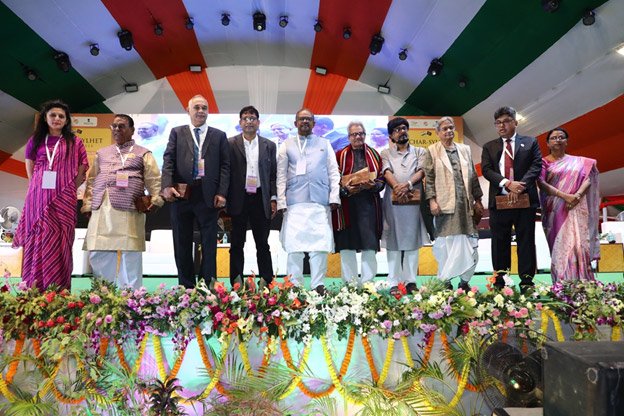
Panel Discussion- III was followed by cultural performances.
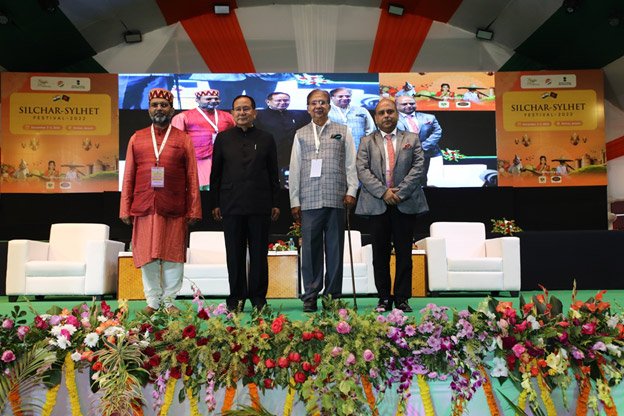
The Valedictory Session of the first international Silchar-Sylhet Festival was held after the cultural performances. It was graced by Shri Rajkumar Ranjan Singh, Hon’ble Minister of State, Ministry of External Affairs, India, Rajdeep Roy, Member of Parliament, India, Mr Shamsher M Chowdhry, Former Foreign Secretary, Bangladesh & Alok Bansal, Director, India Foundation.
Mr Shamsher M Chowdhry began his address by saying “The relationship between India & Bangladesh is written in blood, it is rooted in irreversible history and irrevocable geography”. He added Silchar-Sylhet Festival 2022 should not just be an event, it should be a part of a long-term process between the two countries. He proposed to institutionalise the Silchar-Sylhet Joint Chambers of Commerce in 2023 in the upcoming Sylhet-Silchar Festival 2023 scheduled to take place in Sylhet, Bangladesh. He said the force behind the golden era of the Bangladesh-India relationship is Sheikh Hasina, Prime Minister of Bangladesh & Shri Narendra Modi, Prime Minister of India.
In his remarks, Shri Rajkumar Ranjan Singh said, through this event, we have received an opportunity to reflect upon how the relationship between our people translates into actions in the context of India-Bangladesh ties. He stated that “since India is celebrating Azadi ka Amrit Mahotsav, it’s 75 years of Independence and Bangladesh has just celebrated 50 years of liberation, exchange of ideas, the convergence of thoughts & action will bring progress & prosperity in both the countries”. Further adding Shri Raj Kumar Ranjan Singh stated that these exchanges at a higher level, symbolise the strength of the partnership between India & Bangladesh & the importance it holds for the future. Bangladesh & India are working continuously to facilitate the seamless movement of people & goods. We are working together to revive the rail, roads & waterways that traditionally link the people & economies on both sides and collaborating to further integrate the railway network through cross-border links & strengthening.
